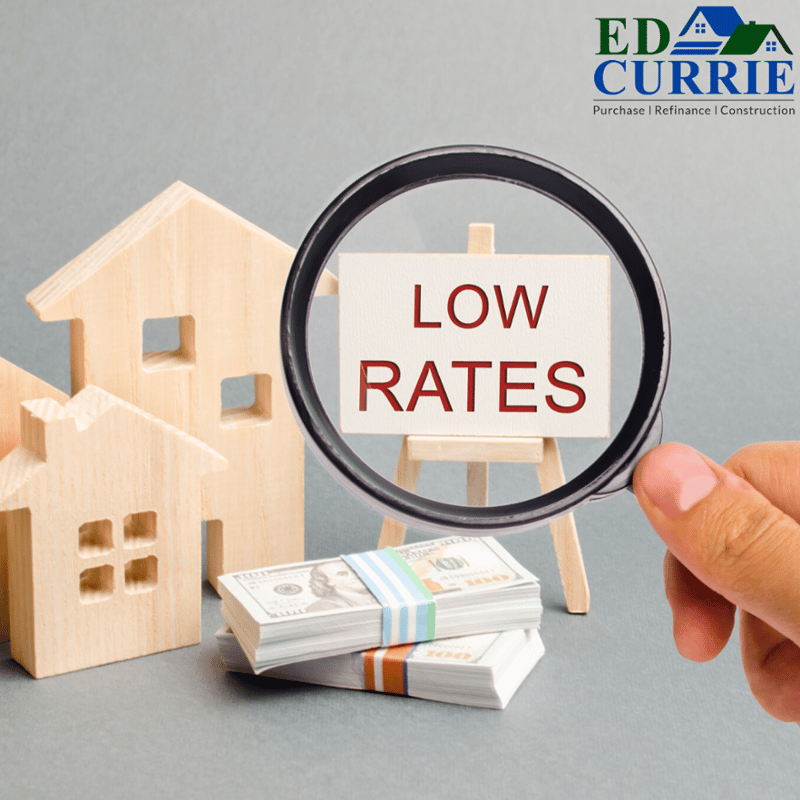Put Your Offset Account To Work
Having the equity in an offset account means you can easily access these funds when you need them and not have to work to get exceptions with your bank.
For example, you can choose to make extra mortgage repayments to maximise your capital position or take advantage of other investment opportunities.
Did you know that an offset account is split between the loan facility and the deposit account?
For tax purposes, youre typically better off keeping most of the unused funds from refinancing into the deposit account.
Thats because you cant claim a tax deduction on principal payments on an investment loan.
Also Check: Elca Mission Investment Fund Rates
You Could Lower Interest Rate On Your Mortgage
The most obvious reason people refinance rental property is to lower their interest rate. If you qualified for a higher rate than whats currently offered in the market, consider refinancing your mortgage. A lower interest rate could mean lower monthly payments and more cash flow.
The interest rate youll get will depend on the housing market, your income, credit score and other requirements put in place by your lender.
Should I Refinance To Interest Only Payments
Whether youre currently making interest only payments on your home loan or not, does it always make sense to refinance to interest only?
It depends on your investment strategy and the market.
In an environment where variable rates are lower than fixed rates, youre typically better off choosing an interest only term and building up your offset account balance to maintain stable cash flow.
The capital management benefits are significant if you want to continue to grow your property portfolio or youre pursuing a property flipping strategy and need funds for renovation work.
However, refinancing to interest only rather than principal and interest repayments may not be the best approach if you want to be in a positively-geared position in the short-term.
Its essential that you seek professional advice from a qualified account to consider what your financial goals are.
After that, give us a call on 1300 889 743 or fill in our online enquiry form and we can let you know if you qualify for an interest-only investment loan.
Don’t Miss: Best Platform To Start Investing
Lower The Refinance Rates For Your Investment Property
You might be surprised by the difference between an investment property and a primary propertys interest rate. Typically, the interest rate for an investment property runs at least 0.5% 0.75% higher than what the same borrower might pay for a mortgage on their primary residence.
Investment properties represent a larger risk for lenders. Banks and online lenders know that if you run into financial hardship and can only afford a single mortgage payment, youll always choose your personal home.
To account for this risk, lenders charge more in interest on investment properties. Two mortgage payments can be unsustainable, so you might want to search for a lower rate by refinancing.
Refinancing can give you access to lower rates if you can show that you are successfully managing your rental property. Compare your current interest rate with offers from lenders before you refinance.
What Are The Advantages

One of the biggest advantages of a cash-out refinance is the potential to lower your interest rate. When it comes to financing investment properties, the interest rate on them might be higher than a regular mortgage since this would not be your primary residence. By refinancing your mortgage, you may be able to get a lower rate and in turn, save a lot of money in the long run.
Another thing that you may be able to do be refinancing an investment property is changing the loan term. Maybe you are someone who wants to pay your mortgage off earlier so you can own the property outright. Refinancing to a lower term would be able to help you achieve this.
Read Also: How To Invest In Stocks Outside Of Us
To Consolidate Your Debt
Do you have a personal loan, car loan, and/or credit card debt? These debts can be annoying to keep track of, especially if you have an investment loan to deal with too. With debt consolidation, you can consolidate these debts under your investment loan to just make one monthly repayment, instead of multiple. It also means all your debt will be charged at your mortgage interest rate, which is typically lower than interest rates associated with unsecured debt.
What Is Delayed Financing
Investors are normally required to wait six months before refinancing a rental property.
However, the delayed financing exception allows real estate investors who originally purchase a rental property with cash to do a cash-out refinance within a few days of closing on the all-cash purchase.
There are four general guidelines for delayed financing of a rental property that was purchased using cash:
- Investors must have paid for the property in cash.
- Any existing liens or loans on the property must be paid off when the property is refinanced.
- Lender must conduct a title search on the property to verify the borrower did not use financing when the property was first purchased.
Also Check: Best Online Investing For Beginners
Eliminating The Preferred Return With A Cash
Indeed, there is! Instead of selling the property after 5 years, you can a refinance or cash-out refinance the apartment building after 3 years, the period that is in this scenario you would reach the expected level of return. By refinancing, you can return the investors principal funding and simply continue holding onto the property.
Because you have returned the capital, you no longer need to pay out the preferred return rate, but you would continue to supply the investors with 25% of the cash flow and profits from the eventual sale, as they would own this part of the property.
This strategy eliminates the risk to investors after 3 years, and they still enjoy 25% of all cash flow distributions and profits, making this a popular option. For you, this option eliminated the preferred rate payout. You do have the refinance to service, but the rate on that compared to the 8% is minimal.
Interestingly, the return for the investor for Option 1 and 2 are very similar. But for you, the difference is startling. Option 1 would provide you with around $40,000 after 5 years without any investment. Meanwhile, option 2 results in a huge $120,000 after 6 years. Thats well worth waiting the extra year. Or hold on for another 4 years to see a profit of around $230,000
Also Check: Morgan Stanley Investment Banking Division
Tax Deductible Refinancing Costs
There are two main areas of tax deductions that can be claimed when you are refinancing your investment property
However, its important to note that you may not receive the refund for these costs immediately. Youll need to budget as this money could take a long time to be returned to you.
These borrowing costs can be claimed on tax, incrementally, over the first five years of property ownership. But if you sell or refinance the property within that time period, you should be able to claim the remaining tax deductions straight away .
Recommended Reading: Short Term Investment Mutual Fund
Why Refinance Your Investment Property
- Lower your monthly mortgage payment
- Maximize your return on investment
- Increase your rental income
- Use the equity in your investment property to buy additional properties
- Use the equity to fund other investment opportunities
Now, lets take a look at what you need to know before you refinance your investment property:
S For A Rental Property Refinance
After reviewing a lenders rental property refinance requirements and gathering and organizing loan documents, borrowers follow these five general steps to apply for a rental property refi:
Also Check: What Are The Best Bond Funds To Invest In Now
If You Qualify You Could Get A Lower Interest Rate And Better Terms
In the United States, investing in real estate is a popular way to build wealth. Many people purchase homes and rent them out, earning income from the rent. In fact, individual investors own roughly 14 million rental properties according to the latest Rental Housing Finance Survey.
Most investors purchase rental properties with home loans. If you own an investment property, you may have a high interest rate, depending on when you took out the loan and your credit score at the time. If you want to take advantage of todays lower rates, you can refinance your mortgage. However, the process to refinance an investment property is a bit different from refinancing your primary residence, and it requires some additional documentation. Here is what you need to know.
The Risks Of Refinancing To Invest In Property

Refinancing using your equity so you can borrow more money to buy an investment property can be a risky move. Make sure you know what you’re doing and considering getting expert guidance from a mortgage broker.
Here are potential risks to consider and precautions to take when planning out your investment.
- Increasing debt. Refinancing to buy an investment means increasing your debt substantially. You are making your original loan larger and longer by accessing some of your equity, and you have the investment loan to pay off two. And there are extra purchasing costs associated with buying the investment, such as stamp duty.
- Untenanted periods. If you can’t find a tenant for a few weeks or months, you’ll find yourself paying off 2 mortgages without the rental income.
- If there is limited price growth in the area or there is not enough demand for property, then you may not receive enough rental income to cover your repayments. Make sure you carefully research the property market to buy in a location that is likely to provide capital gain over time.
- Refinancing costs. Switching lenders and refinancing your mortgage can be an expensive process which is why you need to estimate the total refinancing costs involved. Sit down with an accountant and a mortgage broker to carefully consider the costs that you’ll incur from exiting your current loan as well as the costs of setting up a new home loan .
Read Also: Chief Investment Strategist Alexander Green
Refinancing An Investment Property
If you own an investment property, you might be wondering whether you can refinance it like your primary residence. The answer is yes– but it might be somewhat more expensive to do. Since investment property home loans are considered high-risk than primary home loans, you may have to jump through a few hoops to get a lender to go through with your refinance.
Refinancing A Rental Property Pros
- Save money on your monthly payment: Lower interest rates usually translate to lower monthly mortgage payments. If you qualify for a lower interest rate through refinancing, you may be able to save a considerable amount of money each month, and potentially thousands of dollars in interest costs over the life of the loan.
- Tap equity: With a cash-out refinance, you may be able to replace your current mortgage with a larger mortgage, taking the difference as cash. You can then use that money for other purposes like buying another investment property, perhaps.
- Finance property improvements: A cash-out refinance can also be a good way to finance needed improvements to your rental property, potentially paving the way to charging higher rents after the renovation.
Read Also: High Quality Fixed Income Investments
Investment Property Refinance Rates
Rates for a cash out investment property loan tend to be on the high end for mortgage rates.
Why? Because investment property rates are higher to begin with about 0.5% to 0.75% above primary residence rates on average.
And if you take cash out when refinancing, rates are usually a little higher still. Thats because lenders take on more risk when a homeowner pulls equity out of their property.
The best thing you can do when shopping for this type of loan is get rates from multiple lenders.
New regulations on investment property mortgages mean rates and fees could vary a lot by lender. So compare at least 3-5 loan offers to find the best deal. You could stand to save thousands on your new loan.
You Can Lower The Interest Rate On Your Mortgage
Depending on when you took out the home loan for your investment property, you could have ended up with a relatively high interest rate. For example, rates in 2018 neared 5% for 30-year fixed-rate mortgages. If your mortgage is older than that, then you could be paying an even higher rate.
That’s in stark contrast to the rates that became available in 2020. In January 2021, the average rate for a 30-year fixed-rate loan hit a record low of just 2.65%, while the 15-year fixed was 2.16%. As of March 2022, the rates have climbed a bit, with the 30-year fixed rate at 3.76% and the average rate for a fixed-rate 15-year loan at 3.01%.
If you have good credit and refinance your mortgage, then you could potentially qualify for a lower rate than you have now and save thousands of dollars over the life of your loan.
Recommended Reading: Peer To Peer Investment Platforms
Why Investors Refinance Rental Property
Although many real estate investors buy and hold rental property for the long-term, that doesnt mean that the loan has to stay the same from beginning to end. In fact, making changes to financing may help to increase cash flow and scale up to grow a rental property portfolio.
Here are some of the main reasons and potential advantages for refinancing a rental property:
On a $150,000 loan, lowering the interest rate by 0.25% saves about $240 per year. That extra savings from refinancing to a loan with a lower interest rate can be used to pay down the existing loan balance faster.
Most conventional loans on an investment property offer a term of 30 years. By shortening the mortgage term from 30 to 20 years, an investor can save a significant amount of money spent on interest expense. On a $150,000 loan, an investor could save nearly $40,000 through the life of the loan by changing the mortgage term from 30 to 20 years, assuming a mortgage interest rate of 4.0%.
The faster the mortgage principal balance is paid down, the more potential equity there is in a home that can be pulled out via a cash out refinance and used to purchase additional rental property. Home equity can also increase based on the change in property values depending on the phase of the real estate cycle.
Enable Increase Of Rental Income
If your refinance lets you lower your monthly payment or cash in on your equity, you can then use that freed-up cash to make the kind of investments that increase the income your property creates. You can update the property, repair items that need to be fixed, or add amenities that will justify a higher rent.
Find Out: How to Refinance Rental and Investment Properties
Read Also: How To Invest In Real Estate Syndication
What Are The Benefits Of Refinancing An Investment Loan
Nerdwallets Mortgage Rate Insight

On Wednesday, December 22nd, 2021, the average APR on a 30-year fixed-rate mortgageremained at 3.069%. The average APR on a 15-year fixed-rate mortgagefell 3 basis points to 2.254% and the average APR for a 5/1 adjustable-rate mortgage rose 5 basis points to 2.837%, according to rates provided to NerdWallet by Zillow. The 30-year fixed-rate mortgage is3 basis points higher than one week ago and26 basis points higher than one year ago.
A basis point is one one-hundredth of one percent. Rates are expressed as annual percentage rate, or APR.
You May Like: Can I Buy An Investment Property With No Money Down
Prepare For Stricter Ltv Requirements Than With Primary Residences
Your loan-to-value ratio this is the mortgage amount divided by the appraised value of the property shows lenders how much equity you have in the home. So, if your investment property was appraised at $200,000 and you had a mortgage for $100,000, your LTV would be 50% . The higher your LTV ratio, the more of a risk you seem to the lender and thus the higher interest rate you can expect to pay. For investment properties, most lenders will only let borrowers who have a LTV of 75% or lower refinance. This is stricter than with refis of primary residences. Note, however, that LTV requirements for investment properties vary from lender to lender.